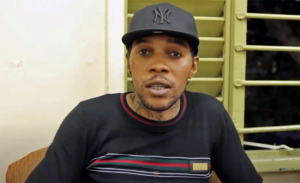A New Chapter in Dancehall Star’s Legal Saga
In a case that captured global attention and dominated headlines worldwide, , the Jamaican Dancehall star, saw his murder conviction overturned by Jamaica’s highest court in London on Thursday. However, contrary to the expectations of his loyal supporters, this doesn’t guarantee his immediate release.

The Privy Council, in its ruling, determined that the local judge presiding over the 2014 trial, where Vybz Kartel, along with Shawn “Shawn Storm” Campbell, Kahira Jones, and Andre St. John were convicted, should have dismissed the case. This decision came due to evident jury tampering and bribery involving one of the 12 jurors in the case. The charges stemmed from a 2011 incident involving the murder of Kartel’s associate, Clive “Lizard” Williams, in a dispute over the delayed return of firearms Palmer had entrusted to him.
As the panel delivered its verdict, many Jamaicans turned to social media platforms, anticipating Kartel’s release. However, instead of setting him free, the court referred the case back to the Jamaican appeals court for retrial or further consideration. The local trial judge had previously acknowledged allegations of juror bribery but deemed the case could proceed lawfully with 11 jurors, resulting in Kartel’s original life sentence.
The trial, lasting 64 days, had captivated audiences across the Caribbean and among Dancehall enthusiasts globally. Kartel has already served a decade in prison, and if a retrial leads to conviction once more, he could face an additional 20 years behind bars, maintaining his original sentence unless reduced in the new trial. Moreover, he faces health issues while incarcerated.
Despite Kartel’s continued detention, the ruling brought hope to locals disillusioned with the justice system. Some expressed satisfaction with the UK legal process, seeing it as fair and impartial compared to their doubts about the Jamaican system.
Kartel expressed confidence in the Jamaican Court of Appeal to uphold equity and justice by ensuring a fair trial. He maintained his innocence and highlighted the injustice he and his co-accused faced in the original trial.
Prosecutors had relied on evidence from mobile phones belonging to Kartel and his co-defendants, revealing a plan to eliminate Williams.
In conclusion, Vybz Kartel’s overturned conviction has ignited hope for a fair trial, yet his future remains uncertain as he awaits potential retrial proceedings.


